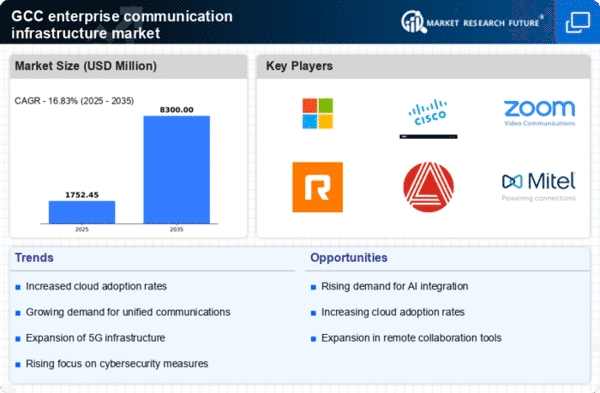The enterprise communication-infrastructure market is currently characterized by a dynamic competitive landscape, driven by rapid technological advancements and an increasing demand for seamless communication solutions. Key players such as Microsoft (US), Cisco Systems (US), and Zoom Video Communications (US) are strategically positioned to leverage their extensive portfolios and innovative capabilities. Microsoft (US) focuses on integrating AI into its communication tools, enhancing user experience and operational efficiency. Cisco Systems (US) emphasizes security and reliability, aiming to capture a larger share of the enterprise market through robust infrastructure solutions. Meanwhile, Zoom Video Communications (US) continues to expand its offerings beyond video conferencing, venturing into collaboration tools that cater to hybrid work environments. Collectively, these strategies not only enhance their competitive positioning but also shape the overall market dynamics, fostering a climate of innovation and customer-centric solutions.
In terms of business tactics, companies are increasingly localizing their operations to better serve regional markets, optimizing supply chains to enhance efficiency and responsiveness. The competitive structure of the market appears moderately fragmented, with several players vying for dominance. However, the influence of major companies remains substantial, as they set benchmarks for quality and innovation that smaller firms strive to meet.
In October 2025, Microsoft (US) announced a significant partnership with a leading telecommunications provider in the GCC region, aimed at enhancing cloud-based communication services. This collaboration is expected to bolster Microsoft’s presence in the region, allowing for improved service delivery and customer engagement. The strategic importance of this partnership lies in its potential to integrate advanced communication solutions with local infrastructure, thereby addressing specific regional needs and preferences.
In September 2025, Cisco Systems (US) unveiled a new suite of security features for its communication platforms, designed to protect sensitive data during virtual interactions. This move underscores Cisco's commitment to security, which is increasingly becoming a critical factor for enterprises in their communication strategies. By prioritizing security, Cisco not only enhances its product offerings but also builds trust with clients, which is essential in a market where data breaches can have severe repercussions.
In August 2025, Zoom Video Communications (US) launched a new AI-driven analytics tool that provides insights into user engagement and meeting effectiveness. This innovation reflects Zoom's strategy to differentiate itself in a crowded market by offering value-added services that enhance user experience. The introduction of such tools may position Zoom as a leader in the analytics space, appealing to organizations seeking to optimize their communication strategies.
As of November 2025, the competitive trends in the enterprise communication-infrastructure market are increasingly defined by digitalization, sustainability, and the integration of AI technologies. Strategic alliances are becoming pivotal, as companies recognize the need to collaborate to enhance their service offerings and market reach. Looking ahead, competitive differentiation is likely to evolve from traditional price-based competition to a focus on innovation, technological advancements, and supply chain reliability. This shift suggests that companies that prioritize these elements will be better positioned to thrive in an ever-evolving market landscape.

















